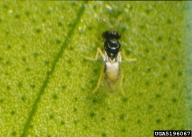| Tamarixia | |
|---|---|
 | |
| Tamarixia radiata | |
| Scientific classification | |
| Domain: | Eukaryota |
| Kingdom: | Animalia |
| Phylum: | Arthropoda |
| Class: | Insecta |
| Order: | Hymenoptera |
| Family: | Eulophidae |
| Subfamily: | Tetrastichinae |
| Genus: | Tamarixia Mercet, 1924 |
| Type species | |
| Tamarixia bicolor Mercet, 1924 | |
| Species | |
See text | |
Tamarixia is a genus of hymenopteran insects of the family Eulophidae, they are parasitoids of Jumping plant lice or psyllids of the superfamily Psylloidea, although some species will parasitise aphids. Most species appear to be ectoparasitoids but at least one species has been recorded as an endoparasitoid. [1]